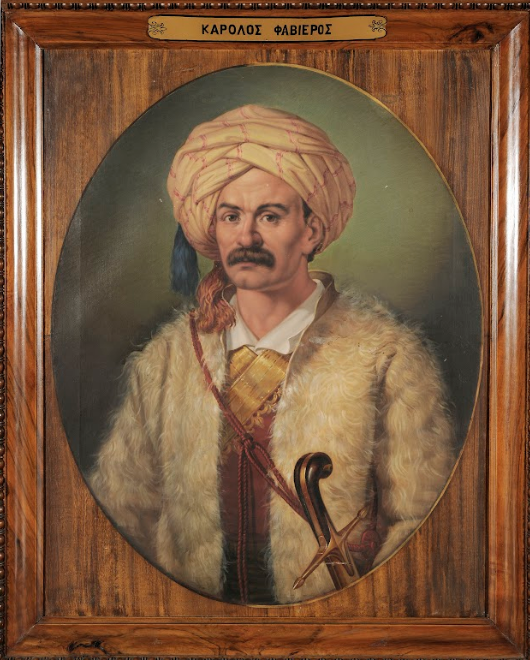Charles Nicolas Fabvier ( 1782-1855 )

French soldier, statesman, and diplomat. Born on December 10, 1782, in Pont-à-Mousson in north-eastern France. He studied at the École Polytechnique in Paris. In 1804 he joined the French army. In the following year, he participated in the Ulm Campaign, during which he was wounded. He was part of the French military mission to the Ottoman Empire in 1807 to shore up the defence of Constantinople. In 1808 he was sent to Persia to help organise its army.
In 1809 he returned to Europe and, now holding the rank of captain, fought once again in the Napoleonic Wars. In recognition of his services, he was named artillery major by Napoleon; he was later raised to colonel and made baron de l’Empire.
Fabvier continued to serve in the French army after the French defeat at the Battle of Waterloo and Napoleon’s downfall. His liberal ideas, however, quickly brought him into disfavour with the Bourbon regime; in 1818 he was suspended from military duty.
In late 1823, under the cover name Borel, Fabvier arrived in Greece for the first time to help the Greeks in the ongoing military operations of the War of Independence. He sought to establish an agricultural and industrial colony to be settled by exiled French and Italian Bonapartists. The revolutionary Greek government responded positively, granting Fabvier suitable land for a fee. Negative developments in the war, however, especially after the launch of Ibrahim’s campaign, prevented the plan from materialising.
After a short trip to western Europe, Fabvier returned to Greece in May 1825. He soon took over command and training of the regular Greek army and participated in many military operations.
In December 1826, leading a force of some 500 men, Fabvier managed to break through the lines of the Ottoman troops besieging the Acropolis in Athens. This daring and heroic action contributed substantially to the relief of the besieged, who managed to resist until May 1827, when they were forced to surrender the Acropolis to Kütahı – securing, however, their release. Fabvier and members of the regular army camped at Methana; in October they left for Chios, to liberate the island. The campaign ended in failure, the blame for which was pinned on Fabvier.
He was still on Chios when, in January 1828, Ioannis Kapodistrias arrived in Greece to become governor. Very soon, a rift broke out between Fabvier and Kapodistrias, with the result that in May of the same year Fabvier resigned as commander of the regular army and left Greece, only to return a few months later as a member of the French expeditionary force under General Nicolas Joseph Maison and seeking to resume command of the Greek army. Kapodistrias turned him down, and in early 1829 Fabvier left Greece for good and returned to France.
In 1830 he took part in the July Revolution and was named military commander of Paris, with the rank of lieutenant general. In 1848, after his final retirement, he was appointed ambassador of France to the Ottoman Empire and then to Denmark. In 1849 he was elected to the National Assembly of France. He retired from public life in 1851.
For his services to Greece, in 1827 the Third National Assembly at Troezen declared Fabvier an honorary Greek citizen; he was later awarded by King Otto of Greece the Grand Cross of the Order of the Redeemer. He died in Paris on September 15, 1855. As a sign of honour for his passing, the Greek army declared three days of mourning.





